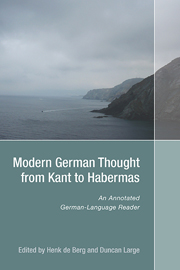Book contents
- Frontmatter
- Contents
- Acknowledgments
- Introduction: German Thought since Kant
- 1 Immanuel Kant (1724–1804)
- 2 Georg Wilhelm Friedrich Hegel (1770–1831)
- 3 Ludwig Feuerbach (1804–72)
- 4 Arthur Schopenhauer (1788–1860)
- 5 Karl Marx (1818–83)
- 6 Friedrich Nietzsche (1844–1900)
- 7 Sigmund Freud (1856–1939)
- 8 Martin Heidegger (1889–1976)
- 9 Walter Benjamin (1892–1940)
- 10 Georg Lukács (1885–1971)
- 11 Max Horkheimer (1895–1973) and Theodor W. Adorno (1903–69)
- 12 Jürgen Habermas (b. 1929)
- Index
- About the Editors
11 - Max Horkheimer (1895–1973) and Theodor W. Adorno (1903–69)
Published online by Cambridge University Press: 05 September 2014
- Frontmatter
- Contents
- Acknowledgments
- Introduction: German Thought since Kant
- 1 Immanuel Kant (1724–1804)
- 2 Georg Wilhelm Friedrich Hegel (1770–1831)
- 3 Ludwig Feuerbach (1804–72)
- 4 Arthur Schopenhauer (1788–1860)
- 5 Karl Marx (1818–83)
- 6 Friedrich Nietzsche (1844–1900)
- 7 Sigmund Freud (1856–1939)
- 8 Martin Heidegger (1889–1976)
- 9 Walter Benjamin (1892–1940)
- 10 Georg Lukács (1885–1971)
- 11 Max Horkheimer (1895–1973) and Theodor W. Adorno (1903–69)
- 12 Jürgen Habermas (b. 1929)
- Index
- About the Editors
Summary
Life and Work
Of the two authors of Dialektik der Aufklärung, Theodor W. Adorno is by far the more influential philosopher. Born in Frankfurt in 1903, he lived his first eleven years in the same street on which Arthur Schopenhauer had once resided. His father, Oscar Wiesengrund, owned a successful wine business; his mother, Maria Calvelli-Adorno della Piana, had been an opera singer. It was only when Adorno emigrated to America, in 1938, that he replaced the patronymic Wiesengrund with the less German-sounding surname taken from his mother. Maria's unmarried sister, Agathe, a well-known pianist, also lived with the family, and within this environment Adorno developed a passion for music. Indeed, for a while he even considered becoming a professional composer: in 1925, after having completed a PhD in philosophy at the tender age of twenty, he moved to Vienna to study composition with Alban Berg, who, like his master Arnold Schönberg, was among the most famous avant-garde composers of the day. But Adorno, though not without musical talent, lacked genuine creativity, and he soon returned to Frankfurt — and to philosophy. In this field, he possessed an originality and mental penetration matched by few. He never lost his interest in music, however, and a significant part of his oeuvre is devoted to the topic.
The Nazi ascent to power in 1933 robbed the Jewish philosopher of his teaching position at the University of Frankfurt and forced him into exile in Britain. He stayed there for the next five years — not, as he had hoped, as a university lecturer, but as a PhD student at Merton College, Oxford. His subsequent emigration to America was facilitated by Max Horkheimer.
- Type
- Chapter
- Information
- Modern German Thought from Kant to HabermasAn Annotated German-Language Reader, pp. 317 - 354Publisher: Boydell & BrewerPrint publication year: 2012



